Medicinal Chemistry with Pharmacology with a Year Abroad
UCAS code F1B1
- Study mode
- Full-time
- Duration
- 5 years
- Start date and application deadlines
-
- Start date
UCAS code F1B1
Passionate about medicinal chemistry and pharmacology? Our MChem Medicinal Chemistry and Pharmacology programme offers advanced modules and research projects focused on drug design and pharmacology. You can specialise in key areas within medicinal chemistry and pharmacology and spend a year abroad studying and experiencing new cultures. This is ideal preparation for a PhD, research career, or expanding your scientific curiosity.
Study Medicinal Chemistry at Liverpool and learn in a culture of research excellence. Medicinal chemistry is a great choice for those with a keen interest in medicinal chemistry, digital chemistry, analytical chemistry and sustainability, alongside traditional areas of organic, inorganic, physical and theoretical chemistry.
The MChem degree in Chemistry equips graduates for a range of career opportunities in academic or industrial research, pharmaceutical and chemical industries, and other fields requiring strong scientific and numerate skills. The programme also provides a foundation for further study in specialized or interdisciplinary areas of medicinal chemistry and pharmacology. The programme offers a mix of interactive teaching, and practical work in our award-winning undergraduate laboratories, ensuring students develop advanced research skills, professional competencies, and a broad understanding of chemistry’s real-world applications
Year 3 will be spent overseas, learning at an approved placement at a partner institution allowing for you to immerse yourself and develop in a new culture.
During year 4, you’ll work with academics to delve into the research literature, an important aspect for all research chemists, or take an opportunity for wider research experiences through summer internships or local industry.
In year 5, students will gain hands-on experience through final year project (3/4 of the year) with leading academics in the field of medicinal chemistry and are exposed to cutting-edge research and global perspectives.
The assessment strategy combines formative workshops and interactive lectures with summative methods including traditional exams, group projects, professional skill development and laboratory-based activities. Since students enter the Department with a wide range of experience in mathematics, physics and biology, which are essential for studying chemistry to a high level, we provide supportive sessions allowing you to tailor your development.
This degree is designed to help you graduate with deep knowledge of medicinal chemistry and pharmacology, practical research experience, and the skills needed for success in advanced study or professional careers in pharmaceutical science and related fields.
Please note, course information has been updated for entry 2026.
This programme has master accreditation from the Royal Society of Chemistry (RSC).

The Royal Society of Chemistry is a learned society for chemists in the United Kingdom.

We’re proud to announce we’ve been awarded a Gold rating for educational excellence.
Discover what you'll learn, what you'll study, and how you'll be taught and assessed.
In Year 1, you’ll study core chemistry topics, explore its broader context and start your specialism in medicinal chemistry. You’ll engage in up to 6 hours weekly of practical chemistry across synthetic, measurement, and digital areas. A flexible foundations module supports varying levels in maths, physics, and biology whilst building professional skills.
Please note some listed modules are currently awaiting approval and may be subject to change.
Compulsory modules
Programme details and modules listed are illustrative only and subject to change.
In Year 2, your journey of core chemistry continues, including aspects of analytical, sustainable, spectroscopy, symmetry, quantum and synthetic strategy/design which is further supported by modules in partnership with Pharmacology. Practical skills build on year 1 themes, operating in alternating weeks of up to 12 hours supplemented by supported analysis/report sessions. Development of quantitative and professional skills continue alongside medicinal chemistry.
Please note some listed modules are currently awaiting approval and may be subject to change.
Compulsory modules
Programme details and modules listed are illustrative only and subject to change.
You’re required to spend the year abroad on an approved placement at a European or overseas partner institution.
In year 3, you’ll study advanced core topics with clear links to our research themes and further core study of medicinal chemistry and pharmacology. Semester 2 can be tailored through the choice of a research-connected optional module with links to the medicinal chemistry sector. Module availability may vary yearly as we develop/adapt to sector demands.
You’ll work with academics to delve into the research literature or spend time on a wider project such summer internships or local industry. You’ll complete modelling, industrially linked activities and medicinally focussed mini-project in preparation for year 5.
Programme details and modules listed are illustrative only and subject to change.
In year 4, you’ll study advanced core topics with clear links to our research themes and further core study of medicinal chemistry and pharmacology. Semester 2 can be tailored through the choice of a research-connected optional module with links to the medicinal chemistry sector. Module availability may vary yearly as we develop/adapt to sector demands.
You’ll work with academics to delve into the research literature or spend time on a wider project such summer internships or local industry. You’ll complete modelling, industrially linked activities and medicinally focussed mini-project in preparation for year 5.
Please note some listed modules are currently awaiting approval and may be subject to change.
Compulsory modules
Optional modules
Programme details and modules listed are illustrative only and subject to change.
The final year of your programme will be dominated by the Chemical research project which accounts for 90 of the 120 credits. You’ll choose which branch of medicinal chemistry and pharmacology you wish to pursue research in, and work throughout the year on original research at the frontiers of medicinal chemistry and pharmacology. This is supplemented by medicinal chemistry linked theory modules which may vary yearly as we develop/adapt to sector demands.
Please note some listed modules are currently awaiting approval and may be subject to change.
Compulsory modules
Programme details and modules listed are illustrative only and subject to change.
A knowledge of core chemistry is fundamental to any chemistry degree. For all years of study, core chemistry material is delivered in a series of interactive lectures, with the interdisciplinary nature of chemistry showcased appropriately. Core concepts are contextualised with publications of recent scientific research whilst encouraging students to be critical of such material, building digital fluency alongside engaging with traditional and modern digital platforms. This is supported by plentiful workshops run by academics to help practice application of material in a supportive and constructive way.
We embrace the diverse nature of our students, whether through their background or pre-university qualification, by offering foundation modules to ensure students have reached a particular competency to progress in wider subjects such as maths, physics and molecular biology. Practical work follows three main themes of synthetic, measurements and digital chemistry across years 1 to 3 with supported assessment preparation time offered to students. We make use of portfolios throughout all lab courses to give students space to fail, reflect and improve to develop lifelong learning. Numerous collaborative group work activities across core modules allow students to consider and discuss major societal and environmental challenges such as UN SDGs and green chemistry principles. Additionally, group work based around applications of industrial research allow further understanding of how industrial processes relate to planetary boundaries and global systems.
We believe the development of the person is core to success, through enhancing professional, employability and entrepreneurial skills via embedded activities throughout all years of our core curriculum including reflective activities, group work, presentations, posters and peer-to-peer activities. Confidence building is developed continuously through discursive and interactive sessions, with learners contributing ideas and analysis in a ‘safe space’ for sharing of ideas and expertise. Additional support is available via our academic advisors to encourage personal development planning for the students.
In the final year students join an existing research group and complete a major research project under the supervision of an expert in their field. These research projects usually are of high quality and can result in publications in respected journals.
All years of study (with the exception of Year One) contribute to the final degree classification. Traditional examinations test learning and problem solving and make and range from 2-4 exams accounting for ~40-50% of our programmes. We supplement this with a range of assessments which are designed to mimic the formats used in employment and postgraduate environments, supporting student preparedness for future careers including:
Feedback is designed to be timely and developmental, helping students self-assess and progress in a structured, supportive environment. Examples include:
Inclusive and accessible practices are embedded throughout our course material design and deployment, such as templates using accessible fonts and colour schemes and prompt release onto our virtual learning environment. Our assessments and feedback are supported in numerous ways:
We have a distinctive approach to education, the Liverpool Curriculum Framework, which focuses on research-connected teaching, active learning, and authentic assessment to ensure our students graduate as digitally fluent and confident global citizens.
The Liverpool Curriculum framework sets out our distinctive approach to education. Our teaching staff support our students to develop academic knowledge, skills, and understanding alongside our graduate attributes:
Our curriculum is characterised by the three Liverpool Hallmarks:
All this is underpinned by our core value of inclusivity and commitment to providing a curriculum that is accessible to all students.
Studying with us means you can tailor your degree to suit you. Here's what is available on this course.
Every student at The University of Liverpool can study a language as part of, or alongside their degree. You can choose:
Our excellence in research strongly influences our teaching, and ensures that you’re engaged in frontier science throughout taught and project modules. Our state-of-the-art Central Teaching Laboratories offer a unique environment in which to study Chemistry, which occupies the top in synthetic and measurement labs, with plentiful equipment for a wide range of experiments.
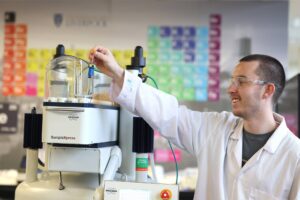
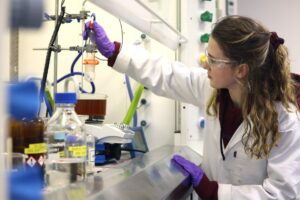
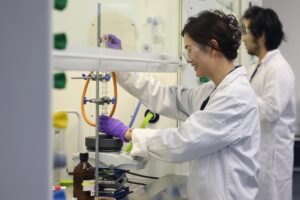
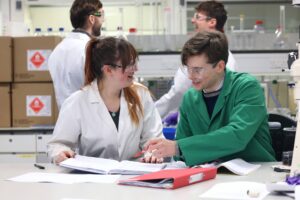
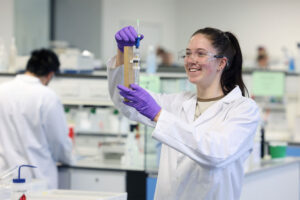

From arrival to alumni, we’re with you all the way:

The research that takes place in the chemistry department here in Liverpool is internationally leading. It makes huge impacts around the world.

Want to find out more about student life?
Chat with our student ambassadors and ask any questions you have.
The rigorous nature of a Chemistry degree is well recognised by employers meaning our graduates are well qualified to take up employment in a variety of fields in addition to chemistry across the chemical sciences, related industries and the general graduate market.
Skills developed include high numeracy and problem-solving abilities, enhanced communication skills, building resilience and confidence to tackle complex, open-ended challenges. Embedded professional skills development, and industry aligned visits and activities (including pharmaceutical industry, fast-moving consumer goods, energy sector, nuclear industry, forensics, patent law), ensure that you make contacts with prospective employers at key stages in your programme.
Typical careers of our graduates beyond moving onto postgraduate studies include:
Our graduates are employed by a vast range of employers, over 160 spanning the last 5 years. Some recent employers include:
100% of our MChem graduates are in high skilled employment.
(Graduate Outcomes, 2021-22.)
Hear what graduates say about their career progression and life after university.
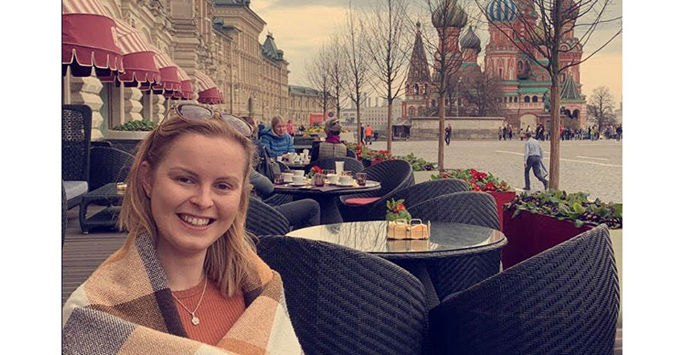
Victoria is graduated from our BSc Chemistry with a year in industry degree in 2020. She received an offer to work as a Global Operations Graduate Associate at AstraZeneca.
Your tuition fees, funding your studies, and other costs to consider.
Full-time place, per year - £9,535
Year abroad fee - £1,385 (applies to year in China)
Full-time place, per year - £29,100
Year abroad fee - £14,550 (applies to year in China)
Fees are for academic year 2025/26. Tuition fees for the academic year 2026/27 will be announced soon.
Tuition fees cover the cost of your teaching and assessment, operating facilities such as libraries, IT equipment, and access to academic and personal support. Learn more about paying for your studies.
Lab coats and safety goggles are provided free of charge. Free access to online core textbooks and a range of other online resources.
Find out more about the additional study costs that may apply to this course.
We offer a range of scholarships and bursaries that could help pay your tuition and living expenses.
If you’re a UK student joining an undergraduate degree and have a household income below £35,000, you could be eligible for a Liverpool Bursary worth up to £2,000 for each year of undergraduate study.
Apply for an Asylum Seekers Scholarship and you could have your tuition fees paid in full and receive help with study costs. You’ll need to have applied for asylum in the UK, or be the dependant of an asylum seeker, and be joining an eligible undergraduate degree.
If you’ve spent 13 or more weeks in Local Authority care since age 14, you could be eligible for a bursary of £3,000 per year of study. You’ll need to be a UK student joining an eligible undergraduate degree and be aged 28 or above on 1 September in the year you start.
Are you a UK student with a Black African or Caribbean heritage and a household income of £25,000 or less? You could be eligible to apply for a Cowrie Foundation Scholarship worth up to £8,000 for each year of undergraduate study.
If you’re a UK student identified as estranged by Student Finance England (or the equivalent UK funding body), you could be eligible for a bursary of £1,000 for each year of undergraduate study.
Joining a School of Biosciences degree and have a household income of less than £25,000? If you’re a UK student, you could apply to receive £4,500 per year for three years of your undergraduate course.
Do you live in the Liverpool City Region with a household income of £25,000 or less? Did neither of your parents attend University? You could be eligible to apply for a Nolan Scholarship worth £5,000 per year for three years of undergraduate study.
Are you a UK student with a household income of £25,000 or less? If you’ve participated in an eligible outreach programme, you could be eligible to apply for a Rigby Enterprise Award worth £5,000 per year for three years of your undergraduate degree.
Are you a UK student with a household income of £25,000 or less? Did neither of your parents attend University? You could be eligible to apply for a ROLABOTIC Scholarship worth £4,500 for each year of your undergraduate degree.
Apply to receive tailored training support to enhance your sporting performance. Our athlete support package includes a range of benefits, from bespoke strength and conditioning training to physiotherapy sessions and one-to-one nutritional advice.
Joining a degree in the School of Electrical Engineering, Electronics and Computer Science? If you’re a UK student with household income below £25,000, you could be eligible to apply for £5,000 a year for three years of study. Two awards will be available per academic year.
If you’re a young adult and a registered carer in the UK, you might be eligible for a £1,000 bursary for each year of study. You’ll need to be aged 18-25 on 1 September in the year you start your undergraduate degree.
Have a question about this course or studying with us? Our dedicated enquiries team can help.
Last updated 19 September 2025 / / Programme terms and conditions